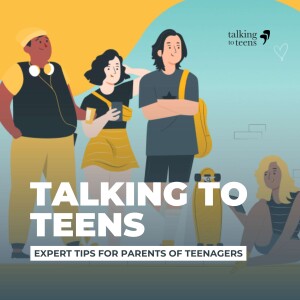
Talking To Teens: Expert Tips for Parenting Teenagers
Kids & Family

Click for full show notes, exercises, and parenting scripts from this episode
We often hear that the secret to a healthy relationship of any kind is communication...but what does that really mean? Does it mean apologizing when we feel we’ve messed up, or daring to discuss uncomfortable topics? Are there certain things we shouldn’t say, and how do we know when we’re communicating too much? How do we get teens who are checked out to actually hear what we’re saying? These questions and more are keeping us from having an open, communicative relationship with our teens.
But when bad communication causes so many problems, it’s understandable that you might be hesitant. When you’re feeling frustrated or upset with your teen, certain ways of communicating can deepen the divide between the two of you instead of building a bridge. Teens who are dealing with pressures from every side of life can sometimes drive us up the wall–and despite our best efforts, we too often let our communication fall into a pattern of yelling, nagging and not really listening to what they have to say.
This week, we’re helping you fight the tendency to slip into all the fussing and fighting. By giving you the guidance to create a healthier, more communicative relationship with your teen, our hope is to bring some harmony to your home. Our guest is David Bradford, professor at Stanford’s graduate school of business and author of Connect: Building Exceptional Relationships with Family, Friends, and Colleagues. David’s been teaching a seminar at Stanford on interpersonal dynamics for two decades, and he’s here to share some of the most valuable insights from his work with us.
David and I are discussing why teens often refuse to hear anything we have to say, and how we can open up a stronger, more positive channel of communication between us and them. We’re providing alternatives to giving advice, which, according to David, in’ts as effective as we think! Plus, we’re discussing what David calls the “three realities of communication” to uncover why our misunderstandings can so often lead to hurt feelings or accusations.
Click for full show notes, exercises, and parenting scripts from this episode
More Episodes
 2022-06-19
2022-06-19
 2022-06-12
2022-06-12
 2022-06-05
2022-06-05
 2022-05-29
2022-05-29
 2022-05-15
2022-05-15
 2022-05-08
2022-05-08
 2022-04-17
2022-04-17
 2022-04-03
2022-04-03
 2022-03-27
2022-03-27
 2022-03-20
2022-03-20
 2022-03-13
2022-03-13
 2022-03-06
2022-03-06
 2022-02-27
2022-02-27
 2022-02-20
2022-02-20
 2022-02-13
2022-02-13
 2022-02-06
2022-02-06
Create your
podcast in
minutes
- Full-featured podcast site
- Unlimited storage and bandwidth
- Comprehensive podcast stats
- Distribute to Apple Podcasts, Spotify, and more
- Make money with your podcast
It is Free
- Privacy Policy
- Cookie Policy
- Terms of Use
- Consent Preferences
- Copyright © 2015-2024 Podbean.com





